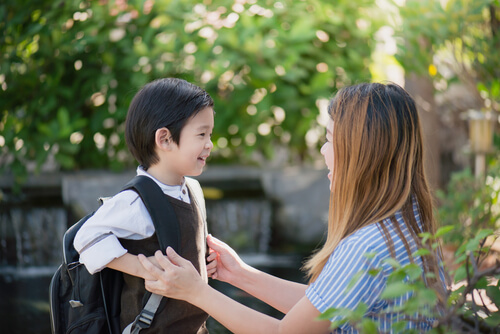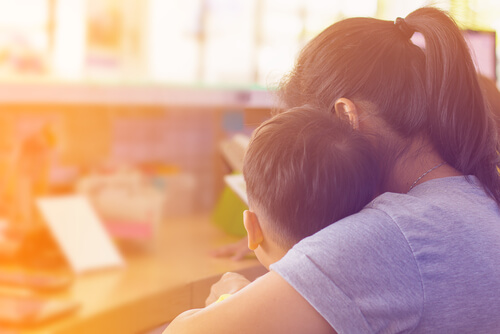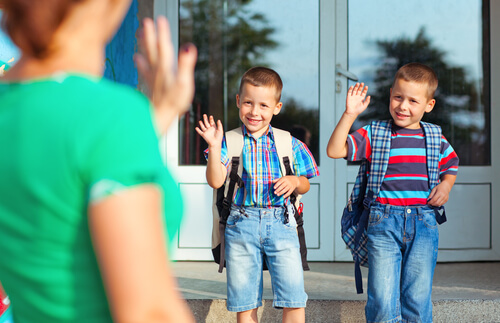Help Your Child Have the Best First Day of School

In this article we’ll give you some tools that might be useful for this very purpose. One of the most important ones has to do with accepting that going to school means change. As adults we might see it differently, but the doors to the world are opening up for your child. So you have to treat the moment with respect. Look after their emotions, and of course, yours too.
Talk with your child about what’s going to happen on the first day of school
The more details and information you give your child, the more secure and confident they’ll feel when they’re in the midst of the changes. These details include things like visiting their new school before the year starts, introducing them to their teacher, and buying their backpack and school supplies together.
Explain the routine step by step, the activities they’ll do, some situations that might come up, how many other children there will be… Also tell them they have to follow school rules, listen to other adults that aren’t mommy or daddy, and share their things with other children.

Be clear about what will happen after school. For example: “Your grandma will pick you up,” or “I’ll try not to be, but if I’m a little late, wait for me at the playground until I get there.” You could leave them with something of yours, like a bracelet or cloth with your perfume, or you can give them a kiss on their little hand so they feel like you’re there with them all day.
Help them get used to some activities and behaviors before the first day of school
There are challenges for parents and children during the school year, like getting up early or eating cafeteria food. When it comes to sleep, you can set up a routine for going to bed and gradually get closer to the 8-10 hours of sleep your child needs. If there won’t be nap time at school, use your vacation to end nap time at home.
As far as diet, you can start to make certain foods and encourage your children to try them at home so there won’t be trouble in the cafeteria. You can also help them by gradually enforcing a stricter eating schedule and routine. That way your little one will be able to adapt better to their school environment.
Spending time with other children can also help prepare them for the situations they’ll be in at school. You can take them to mom groups, family yoga or music classes, and of course the park is a great place to go. It’s somewhere they’ll run into situations that are similar to the ones they’ll see on the school playground.
Children aren’t all the same
It’s important to remember that your child will experience their first day of school based on their unique personality, strengths, and weaknesses. Comparing one child to another won’t add anything to the experience.
It’s not a good idea to encourage your child by saying, “you’ll go to school like your brother or sister.” It’s probably best to say “you’ll go to school and experience new things,” or something like that.
As parents we also act differently with each child, so that’s another reason comparisons don’t help much. They may even end up backfiring. It’s also not the same for your first child to go to school as it is for your second child.
Recognizing your own emotions will help you control them and find a smarter outlet for them.. That doesn’t mean you shouldn’t tell your child you’ll miss them. It just means that if you keep up a positive, relaxed attitude, it’s more likely your child will feel that way too.
Respect the individuality and personality of each of your children. They won’t all adapt the same or experience it in the same way. Trust your child. Even if it takes them a little bit longer, they’ll adapt. Don’t give up right away and they won’t either.

It’s important to adapt
There’s a chance that on the first day of school and soon after your child might start to do things that concern you, like having tantrums you got rid of a while ago. But normally these signs will go away after a few days once your child has gotten used to the routine. Once the environment, classmates, and teachers have become familiar, behavior should improve.
You can also help make these undesirable signs go away more quickly. For example, while they get used to the routine, it’s a good idea to get them up and tuck them in a bit earlier, because it might be hard for them to get to sleep. And make sure everything is ready the day before. But that’s one thing that’s good to keep up for all of their school years.
If you can, during the first few days you or your spouse should take them yourselves. This will boost their sense of security and soothe their feeling of abandonment. Try to get there a bit early to talk to their teacher, other kids, and other parents. When they see you socializing and getting along well that will help them do the same. They’ll feel more secure.
How to do goodbyes right
Goodbyes can be a touchy issue, so it’s best for them to be short. For example you can give a couple hugs and kisses and say comforting words like “you’re going to do great.” Then leave with a smile on your face. That way you smiling will be the image they see when they feel sad and miss you.
They might end up crying, especially the first few days. That’s normal; they’re probably having a hard time being apart from you and adjusting to the new environment. If you take it calmly and patiently and trust the people who work at the school, the sobbing won’t last long.
But if seeing them pout makes you question everything, extend the goodbye, and stay around to make sure they calm down, all you’ll be doing is reinforcing their tantrums and crying. This is the best way to make a behavior that would normally go away on its own stick around.
Picking them up after school
While they adapt it’s also important for whoever picks up your child to be on time so they can see that being at school is necessary, and that you didn’t abandon them there. But this reunion shouldn’t be over the top either, like something out of a movie. Try to make it as normal as possible, like they’ve just spent the afternoon playing with their grandma.
“At school I learned to laugh, and they also taught me one major thing: to laugh at what I respected and to respect what I laughed at.”
-Claudio Magris-

Ask them how their day went and highlight the positives. And if you can, you should even encourage them to spend time after school with a classmate if it’s possible and they liked each other. Each bond they create will make the new situation feel more familiar and help them adapt faster.
Like we said before, adapting is normal and takes time. Some things will probably come up with your child that should go away after a little while, like eating less, sleeping more or less than normal, seeming irritable or sensitive, etc. But if that goes on and they still don’t adapt, and cry every time you leave (or other similar behaviors), it might be good to consult a professional.
In this article we’ll give you some tools that might be useful for this very purpose. One of the most important ones has to do with accepting that going to school means change. As adults we might see it differently, but the doors to the world are opening up for your child. So you have to treat the moment with respect. Look after their emotions, and of course, yours too.
Talk with your child about what’s going to happen on the first day of school
The more details and information you give your child, the more secure and confident they’ll feel when they’re in the midst of the changes. These details include things like visiting their new school before the year starts, introducing them to their teacher, and buying their backpack and school supplies together.
Explain the routine step by step, the activities they’ll do, some situations that might come up, how many other children there will be… Also tell them they have to follow school rules, listen to other adults that aren’t mommy or daddy, and share their things with other children.

Be clear about what will happen after school. For example: “Your grandma will pick you up,” or “I’ll try not to be, but if I’m a little late, wait for me at the playground until I get there.” You could leave them with something of yours, like a bracelet or cloth with your perfume, or you can give them a kiss on their little hand so they feel like you’re there with them all day.
Help them get used to some activities and behaviors before the first day of school
There are challenges for parents and children during the school year, like getting up early or eating cafeteria food. When it comes to sleep, you can set up a routine for going to bed and gradually get closer to the 8-10 hours of sleep your child needs. If there won’t be nap time at school, use your vacation to end nap time at home.
As far as diet, you can start to make certain foods and encourage your children to try them at home so there won’t be trouble in the cafeteria. You can also help them by gradually enforcing a stricter eating schedule and routine. That way your little one will be able to adapt better to their school environment.
Spending time with other children can also help prepare them for the situations they’ll be in at school. You can take them to mom groups, family yoga or music classes, and of course the park is a great place to go. It’s somewhere they’ll run into situations that are similar to the ones they’ll see on the school playground.
Children aren’t all the same
It’s important to remember that your child will experience their first day of school based on their unique personality, strengths, and weaknesses. Comparing one child to another won’t add anything to the experience.
It’s not a good idea to encourage your child by saying, “you’ll go to school like your brother or sister.” It’s probably best to say “you’ll go to school and experience new things,” or something like that.
As parents we also act differently with each child, so that’s another reason comparisons don’t help much. They may even end up backfiring. It’s also not the same for your first child to go to school as it is for your second child.
Recognizing your own emotions will help you control them and find a smarter outlet for them.. That doesn’t mean you shouldn’t tell your child you’ll miss them. It just means that if you keep up a positive, relaxed attitude, it’s more likely your child will feel that way too.
Respect the individuality and personality of each of your children. They won’t all adapt the same or experience it in the same way. Trust your child. Even if it takes them a little bit longer, they’ll adapt. Don’t give up right away and they won’t either.

It’s important to adapt
There’s a chance that on the first day of school and soon after your child might start to do things that concern you, like having tantrums you got rid of a while ago. But normally these signs will go away after a few days once your child has gotten used to the routine. Once the environment, classmates, and teachers have become familiar, behavior should improve.
You can also help make these undesirable signs go away more quickly. For example, while they get used to the routine, it’s a good idea to get them up and tuck them in a bit earlier, because it might be hard for them to get to sleep. And make sure everything is ready the day before. But that’s one thing that’s good to keep up for all of their school years.
If you can, during the first few days you or your spouse should take them yourselves. This will boost their sense of security and soothe their feeling of abandonment. Try to get there a bit early to talk to their teacher, other kids, and other parents. When they see you socializing and getting along well that will help them do the same. They’ll feel more secure.
How to do goodbyes right
Goodbyes can be a touchy issue, so it’s best for them to be short. For example you can give a couple hugs and kisses and say comforting words like “you’re going to do great.” Then leave with a smile on your face. That way you smiling will be the image they see when they feel sad and miss you.
They might end up crying, especially the first few days. That’s normal; they’re probably having a hard time being apart from you and adjusting to the new environment. If you take it calmly and patiently and trust the people who work at the school, the sobbing won’t last long.
But if seeing them pout makes you question everything, extend the goodbye, and stay around to make sure they calm down, all you’ll be doing is reinforcing their tantrums and crying. This is the best way to make a behavior that would normally go away on its own stick around.
Picking them up after school
While they adapt it’s also important for whoever picks up your child to be on time so they can see that being at school is necessary, and that you didn’t abandon them there. But this reunion shouldn’t be over the top either, like something out of a movie. Try to make it as normal as possible, like they’ve just spent the afternoon playing with their grandma.
“At school I learned to laugh, and they also taught me one major thing: to laugh at what I respected and to respect what I laughed at.”
-Claudio Magris-

Ask them how their day went and highlight the positives. And if you can, you should even encourage them to spend time after school with a classmate if it’s possible and they liked each other. Each bond they create will make the new situation feel more familiar and help them adapt faster.
Like we said before, adapting is normal and takes time. Some things will probably come up with your child that should go away after a little while, like eating less, sleeping more or less than normal, seeming irritable or sensitive, etc. But if that goes on and they still don’t adapt, and cry every time you leave (or other similar behaviors), it might be good to consult a professional.
This text is provided for informational purposes only and does not replace consultation with a professional. If in doubt, consult your specialist.







